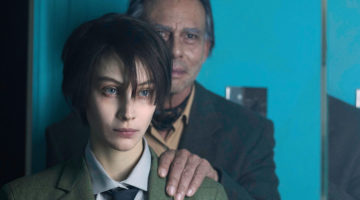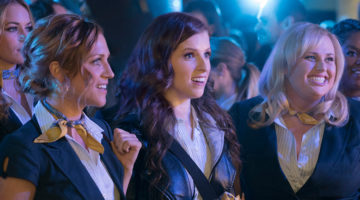Review: Mad Max: Fury Road
It strains to think of a summer blockbuster title hero more incidental than Max Rockatansky. Our loner in an anarchic, futuristic desert world aligns himself with a renegade that happens to have a common enemy. It’s this new partner seeking redemption, as well as a young man in search of salvation, that are the far more compelling and indeed leading characters.
That is not to say that Max, played by a charming and observant Tom Hardy, taking over the role made famous by Mel Gibson, isnt’ of note. He is there to supplement both muscle and brain, as well as a bit of humour, on this endless thrill ride through the dry wasteland. It’s just that Max has no arc, no change, and isn’t as interesting. Put another way: he’s a passenger.
George Miller’s long-awaited, much-anticipated return to the Australian outback (here shot in Namibia) with Mad Max: Fury Road does not sit idly by. A wild opening act gives way to one adrenaline-fueled action spectacle after another, all of which are clear and crisp and prove that gasoline-guzzling set pieces don’t have to devolve into simple noise and explosion (ahem, Michael Bay).
Still though, Miller wants to poke and prod the viewer to think a little bit more about what is really going on.
While gas and water are rare commodities in this desolate future, there is a new piece of property kept tightly guarded: women. Specifically, those fertile, ample females that provide sustenance in the form of milk, and the chaste young bodies of the beautiful that are used as vessels for a tyrant. The deformed Immortan Joe (Hugh Keays-Byrne, returning to the franchise as a different villain) runs a rugged outpost where fit young men will die in his name as slaves are kept without food or water.
So when the metal-armed Imperator Furiosa (Charlize Theoren) kidnaps Joe’s Five Wives (notably Zoe Kravitz and Rosie Huntington-Whiteley) to bring them to freedom, all our characters are put on all literal and figurative collision course with one other traversing the titular passage. An imprisoned Max eventually is forced to team up with Furiosa after escaping a wild, naive gearhead Nux (Nicholas Hoult) who has been draining his blood and trying to impress his leader.
Hoult, unrecognizable with his shaved head, white body paint, and a bevy of tattoos and disfigurements, is especially fascinating, an initially loathsome character who is ready to die for a misleading cause.
It is ultimately the case of the females in the film that garner the most attention. At one point it becomes indeed men versus women – save for Max who sides with the latter. Rather, it happens that this is the case. The armies of Joe are male maniacs, and those imprisoned by him supply milk and babies. “We are not things,’ is shouted and written on the wall on their chamber. Miller doesn’t view women as decorations either, and in what is one of the most feminist action adventures, they fight and kill, they take punches and die, sometimes violently. They are active particpants in a brutal existence, and Furiosa in particular trades heroic feats with Max, though never in competition. Something refreshing happens when Max misses two long shots from a distance only to hand over the rifle to Furiosa for one last chance.
Interpretations of these images will run the gamut, but in Miller’s eyes, who brought in The Vagina Monologues founder Eve Ensler to speak to the actresses about female trauma, women are equal, both heroes and victims, as tough and vulnerable as men.
Which brings things back to Max. A hero yes, but surely not alone, and not any more heroic than others in the film. Hardy does so much with so little in a film where dialogue is sparse, offering moments of humour and affection with a simple wink or grunt. Like the viewer, he finds himself along for this absurd, crazy entertaining roller coaster.
[star v=45]







